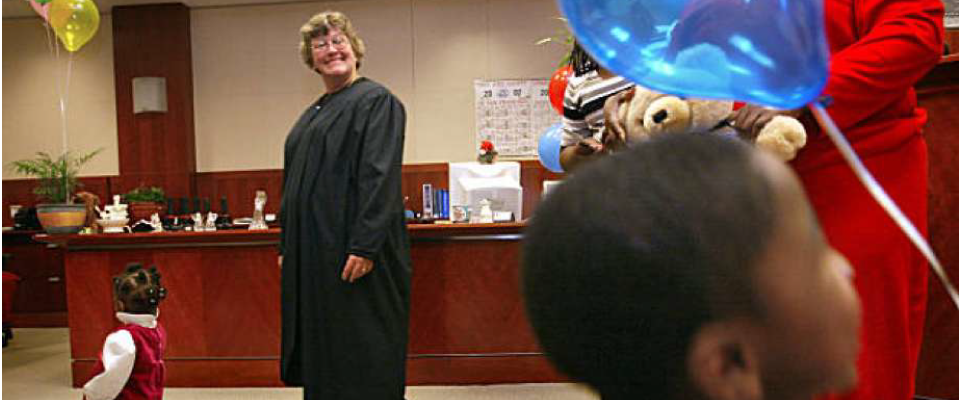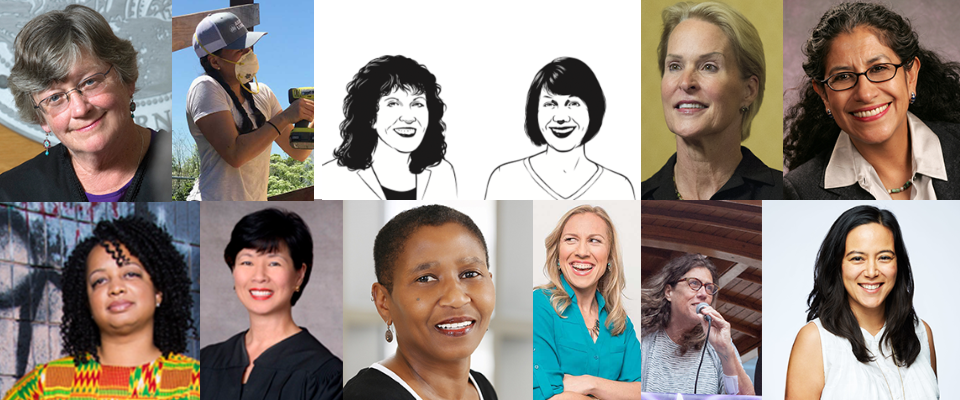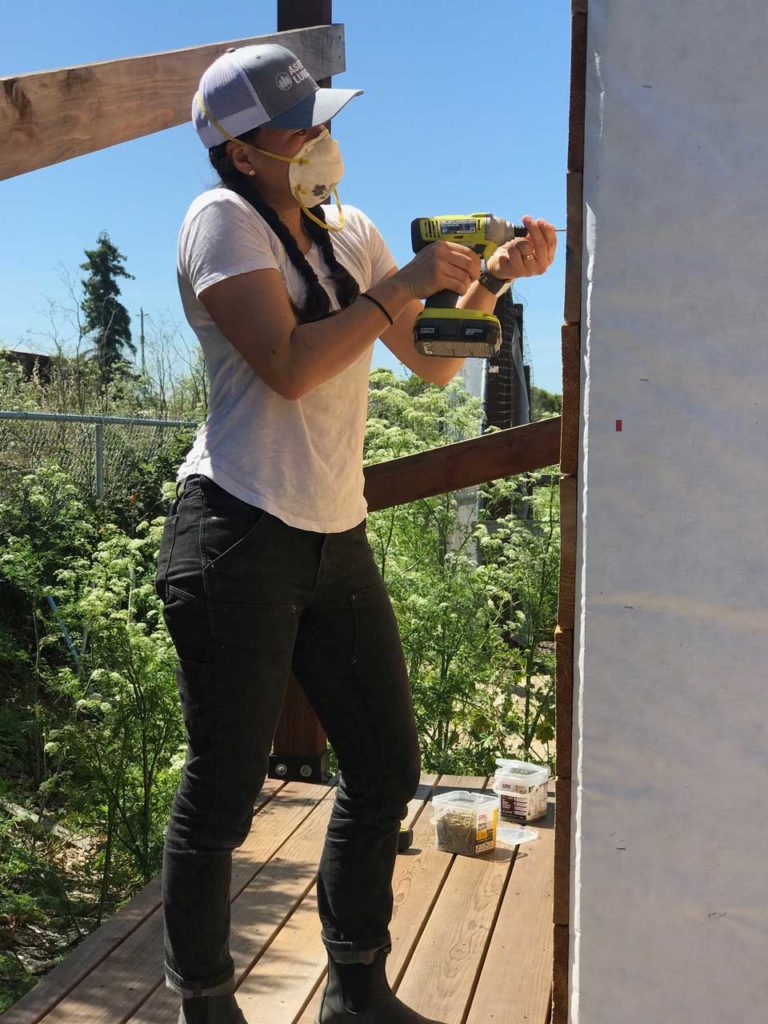It may be surprising that Donna Hitchens M.A., J.D. ’77—who became the first openly lesbian judge elected to the bench in the United States and spent 20 years of her career on the California Superior Court bench—never dreamed of becoming a lawyer, nevermind a judge.
Hitchens explains, “I never knew a lawyer growing up. Never met one. You know, I did not come from a professional family.” Hitchens’s career in law was driven by her commitment to seeing justice brought for victims and for those who become lost in the legal system.
After earning her bachelor’s degree in community leadership and development and a master’s in counseling from Springfield College, Hitchens was not on the legal profession path. She was working as a counselor at the University of Maine when one event changed the trajectory of her career path. “We were having a case conference one day with some of the psychologists and a couple of the deans, about a young woman whose boyfriend had tried to run her over with a car, and several of the people in the room said, “Well, what did she do to provoke him?” And I thought, “Well, excuse me—why are we blaming the victim?”
Having been involved in activism with the civil rights movement since high school, Hitchens needed no more than this moment to spark her desire for a career field in which she could be more of an activist. “I grew up in the ’60s … saw a lot firsthand about the level of discrimination, especially against African Americans, and felt a responsibility to speak out against that. I got involved with a couple of groups that were working on civil rights issues with respect to race, and then after I moved up to Maine, I got more involved in the women’s movement, so it was sort of the combination of those two things that and my activism in those two areas that really led me to choose law school.” She began applying to law schools across the country. Hitchens laughs, “I had no idea [where to apply], I just picked cities that I liked.”
Finding Opportunity in the Face of Adversity
After one year at Golden Gate Law in San Francisco, Hitchens transferred to Berkeley. She remembers facing a challenging, often discriminatory environment for women students at Berkeley. Hitchens had only two women law professors during her time at Berkeley and remembers facing discrimination as a woman. “There was just some inherent sexism in the legal system back in those days, and there were some professors who almost never called on women, or used terms of endearment that were kind of offensive.” Despite this adversity, Hitchens was determined to find justice for those on the fringe of the legal system.
Hitchens attributes much of her success to one of her professors, Herma Hill Kay. Hitchens explains that in her second semester of her second year, “I was taking a class with Professor Herma Hill Kay and she told us about this clinical program that was done at Equal Rights Advocates (ERA). It was a combination of trial skills and working on gender discrimination cases.” Hitchens did a clinical semester at ERA, a firm specializing in gender discrimination cases with a mission to fight for gender justice in workplaces and schools across the nation. Of her time there, Hitchens shares, “It really fostered my passion for civil rights work. I continued to work there after my clinical program, and that was the organization through which I started The Lesbian Rights Project. I also happened to meet Nancy Davis there, who was also a Boalt grad, and she became my partner and my spouse. Now we’ve been together for 43 years. So I really attribute Professor Herma Hill Kay to changing my life completely, and she continued to be a dear friend and mentor to both of us.”
The Lesbian Rights Project
“I am also excited by the new movement for social justice led by Black Lives Matter. I am hopeful this may finally bring about some real and significant change with respect to institutionalized inequality.”
While working at ERA, Hitchens decided to shift her focus to advocating for the rights of lesbian women. In the same year she graduated from Berkeley Law, Hitchens approached the board of ERA for support and received a grant from the Berkeley Law foundation to start the Lesbian Rights Project, which provided legal assistance to low-income lesbians facing discrimination or legal issues over their sexual orientation. Hitchens’s project became the first public-interest law firm in the country to focus solely on the legal issues lesbian women faced. Hitchens says, “I had been involved with the lesbian movement and found that all of the public-interest law firms in the country that dealt with lesbian and gay issues were male-oriented; they dealt with sodomy laws and stuff like that, and nobody was dealing with issues that were relevant to lesbians, like family issues, employment discrimination, and housing discrimination.”
In 1988, the Lesbian Rights Project transformed into the National Center for Lesbian Rights, expanding its scope to include legal issues faced by the LGBTQ+ community across the country. To this day, Hitchens considers the Lesbian Rights Project one of her biggest accomplishments. “Once the organization really transitioned to the National Center for Lesbian Rights, they were starting to take cases all over the country. And I think that organization has had just a huge impact on LGBT rights throughout the country.”
Gaps in the Justice System
While working at the Lesbian Rights Project, Hichens continued to do part-time law work for the ERA. She then went on to work for the American Civil Liberties Union (ACLU) for a year and did private practice for about four years. Around 1990, she was approached by more than a few people who wanted her to run for a position on the bench of the San Francisco Superior Court. Hitchens remembers, “The governor had … only appointed white male prosecutors to the bench, and I had never really dreamed of being a judge—or even thought much about it. A number of people approached me, there was an election with one of his appointees, and said ‘Why don’t you run?’ And I thought, ‘Well, do I really have anything to lose?’ And so I ran and I won by a very slim margin, and that’s how I ended up on the bench.”

Hitchens became Presiding Judge for the Superior Court of San Francisco County. Perhaps one of her biggest successes during her time on the bench was creating the San Francisco Unified Family Court. At the Unified Family Court, cases in marriage and divorce, adoption, domestic violence, and juvenile delinquency, matters which often overlapped, were overseen by one judge who knew the family’s full history and legal matters. In an SFGate interview, Hitchens gave an example of a dangerous oversight that was possible before this unification. “A judge might release a teenager from juvenile hall because his father promises to make sure the youth stays on track—but the judge might not know the father has a restraining order from the youth’s mother because of domestic violence.”

Hitchens spent her career in steadfast devotion to transforming the justice system for low-income individuals, those lost in the legal system, and marginalized groups. She also helped implement programs such as Dependency Mediation, which allows parents whose children have been removed from their care to help come up with a solution, as well as working alongside the Bar Association of San Francisco to establish the court’s Family Law Self-Help Center. Hitchens also chaired the San Francisco Safe Start Initiative, which is dedicated to supporting young children exposed to violence. As a result of her efforts, in 2001 she was awarded the Benjamin Aranda Access to Justice Award, and in 2002 she received the Judicial Officer of the Year Award from the Family Law Section of the State Bar of California.
When asked what advice she would give to a recent Berkeley Law grad, Hitchens says, “Get as much practical experience and exposure as you can. There are opportunities to do clinical programs, to take advantage of those opportunities. I know that the Henderson Center provides a lot of opportunities for educational programs and networking and making big contacts. But I really think that my work outside the classroom was much more significant in my career than my actual classes.”
After a long and impactful 20-year career on the bench, Hitchens is now retired. Today, she is proud to see significant changes taking place in our country. “I was pleased with several of the recent Supreme Court decisions, especially the Title VII and DACA cases that provide some protection for LGBTQ workers and immigrant children, two very vulnerable populations. I am also excited by the new movement for social justice led by Black Lives Matter. I am hopeful this may finally bring about some real and significant change with respect to institutionalized inequality.” Hitchens’s influence is seen in San Francisco’s justice system and across the country. The National Center for Lesbian Rights has helped thousands of people navigate the legal system as they fight for justice against discrimination. If Hitchens’s story can teach us one thing, it’s that if we follow our passions, our dreams will unveil themselves in ways we never expected.




















